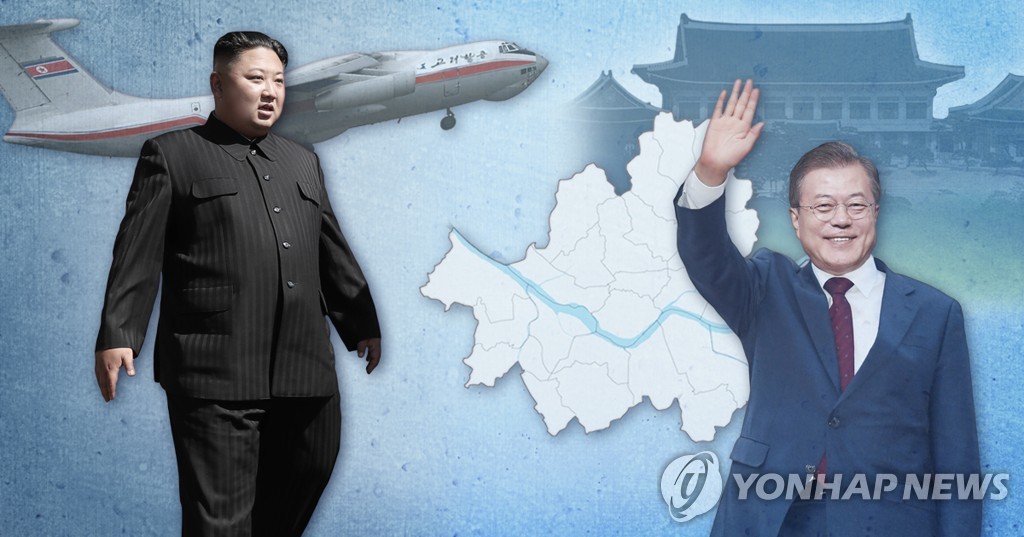(News Focus) Kim can show commitment to denuclearization by visiting Seoul: experts
(News Focus) Kim can show commitment to denuclearization by visiting Seoul: experts
15:20 December 04, 2018
By Choi Soo-hyang
SEOUL, Dec. 4 (Yonhap) -- North Korean leader Kim Jong-un can show the world he is a leader who keeps his promises, and is committed to denuclearization, if he carries out his pledge to visit Seoul before the end of the year, experts said Tuesday.
Kim promised to visit Seoul before year's end when he held his third summit with South Korean President Moon Jae-in in Pyongyang in September, though prospects for such a trip have since dimmed as nuclear talks between the U.S. and the North have stalled over Pyongyang's demand for sanctions relief and the U.S.'s insistence on more denuclearization measures.
Talk of his trip to Seoul, however, gained significant traction this week after U.S. President Donald Trump indicated during a meeting with Moon that it doesn't matter if Kim's visit to the South takes place before he holds a second summit with the North's leader.
Moon said Trump shared the view that Kim's visit to the South could provide momentum and play a positive role in denuclearization talks between the United States and the North. Trump was also quoted as asking Moon to relay a goodwill message from him when Kim visits Seoul.
Experts said that while Kim is expected to carry out his own cost-benefit analysis before deciding whether or not to take the trip, one significant benefit of a visit to Seoul would be that such a trip would send a message to the world that Kim makes good on his word.
"By keeping the promise to visit Seoul, one that his father could not live up to, Kim can show the world that he is a trustworthy leader, and could further build an amicable atmosphere in negotiations with the U.S.," Cheong Seong-chang, Vice President of Research Planning at the Sejong Institute, said.
Cheong was referring to the promise that Kim's father and late leader Kim Jong-il made when he held the first-ever inter-Korean summit in Pyongyang in 2000 with then South Korean President Kim Dae-jung. The North's late leader pledged to make a reciprocal visit to the South, but he never did.
Yang Moo-jin, a professor at the University of North Korean Studies, reiterated the importance of following through, saying that such a factor could lead Kim to accept the risks associated with making the first-ever trip by a North Korean leader to South Korea.
"For Kim, the most important thing is showing that he keeps promises, sending a message that the promises he has made to the U.S. and the international community are not in vain," Yang said. "It can also be an indirect message to the U.S. that North Korea is committed to implementing their summit agreements."
Progress toward denuclearization steps, if discussed during the promised visit, could contribute to the success of a second meeting between Trump and Kim, which Trump said is likely to take place in January or February, experts said.
"With the prospect of the second U.S.-North Korea summit early next year, Kim would want to hear what discussions went on between Moon and Trump at their latest meeting," Cheong, the researcher at the Sejong Institute, said, referring to the bilateral talks that took place in Buenos Aires on the sidelines of the Group of 20 meeting on Friday.
 zoom in/out
zoom in/outNorth Korean leader Kim Jong-un (L) and South Korean President Moon Jae-in (Yonhap)
hide caption
If realized, Kim's trip would mark the first time that the North's highest leader has set foot in the South's capital since the division of the peninsula. All inter-Korean summits have taken place either in Pyongyang or at the border village of Panmunjom.
Yet, some watchers say Kim may choose not to visit the South at a time when he isn't sure whether he will get practical gains from the trip.
"Kim might think that the conditions and circumstances are not yet ripe to make the visit. He will come only when there is something to gain, whether it be something economic or not, in return for the risk he would have to go through by making the trip," Lim Eul-chul, a professor at the Institute for Far East Studies at Kyungnam University, said.
Domestic politics will also factor into Kim's consideration amid the impasse in its nuclear talks with the U.S., Lim said.
"Kim wouldn't want to face a situation where he keeps making concessions in denuclearization talks without any clear gains while the eyes of North Korea's high-ranking officials, elites and ordinary people are fixed on him," Lim added.
North Korea wants the U.S. to ease sanctions in exchange for the denuclearization steps the regime has taken so far, including blowing up its nuclear testing site. But the U.S. insists that sanctions relief is possible only after the North's complete denuclearization.
Technical issues, including security concerns, also linger as an obstacle for Kim's visit.
"There is skepticism that there isn't just enough time to prepare for the visit within this year. We are not talking about some working-level talks that could happen behind the scenes," Yang said. "Officials in charge of security services from the two sides should meet and hold multiple rehearsals, but there hasn't been any sign of such moves yet."
The Seoul government is maintaining the stance that it is still possible and necessary for Kim to visit before the end of this year. A unification ministry spokesman said Monday that relevant preparations are under way to carry out the agreements reached between the two Koreas.
During a visit to New Zealand on Tuesday, President Moon said that Kim's visit can take place within this year, but he added that what matters more than the timing of his visit is making sure that his visit will contribute to progress toward the North's denuclearization.
No comments:
Post a Comment